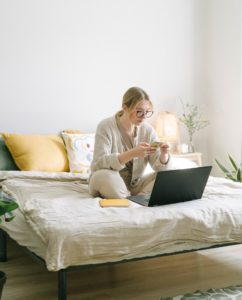Sleep
The Harmful Effects of Blue Light on Sleep
 Are you checking your phone or laptop before bed? Blue light emitting from these electronic devices have been shown to impact your sleep quality and could be part of why you have difficulty sleeping, waking, or having a restful sleep. Knowing how to manage your bedtime routine and minimize blue light can be a game-changer for your sleep cycles. Let’s dive into how blue light can influence our sleep and what we can do to manage it.
Are you checking your phone or laptop before bed? Blue light emitting from these electronic devices have been shown to impact your sleep quality and could be part of why you have difficulty sleeping, waking, or having a restful sleep. Knowing how to manage your bedtime routine and minimize blue light can be a game-changer for your sleep cycles. Let’s dive into how blue light can influence our sleep and what we can do to manage it.
What is Blue Light?
Blue light is a type of electromagnetic energy. We have many types of this energy all around us, including radio waves, microwaves, and UV waves. This isn’t naturally bad energy, but it can be harmful in certain quantities of exposure. For example, UV rays can give us sunburn if we are in them too long. These are invisible to the eye, but research gives us more insight into how they affect us.
Blue light is the energy wave emitted by things like the sun, fluorescent lights, electronics, and other forms of light. It affects how alert we are, our hormone production, and our sleep. When we use digital devices, particularly before bed or for long periods, it can lead to disruption in our sleep cycles and our energy levels. There have been some concerns about eyestrain and eye health, although this is still being researched.
What Does This Mean for Sleep?
Light impacts our circadian rhythms, which are cycles that tell our body what functions it needs to perform. This is closely aligned with the sun. For example, our bodies’ wake up’ when the sun rises, and we start to relax as darkness approaches. Blue light has the greatest impact on our circadian rhythms and makes us feel more awake. This raises our body temperature and heart rate, making it more difficult to get to sleep.
Blue Light and Melatonin
Melatonin naturally occurs in the body and is a hormone that makes us feel sleepy. Blue light suppresses the body’s natural release of melatonin, tricking the body into thinking it’s still daytime and we need to stay awake. If you have difficulty falling asleep and usually play on your devices or screens before bed, this could contribute to how quickly you can rest. Taking supplements such as calcium, Vitamin D, and 5-HTP have been shown to help increase the natural production of melatonin in the body.
What Gives Off Blue Light?
Many things in our daily lives give off blue light. This wasn’t a concern in the past since the technology wasn’t surrounding us or heavily impacting our workforce. Now, especially since the pandemic, many people work from home and find themselves on a computer for long hours. Most screens, devices, and artificial lights give off blue light. Some of the common items that give off blue light include:
- Tablets and iPads
- Smartphones, like Google and iPhones
- Computer screens
- LED and fluorescent bulbs
- Televisions
- Video game systems
- E-readers
- Laptops

Minimizing Blue Light Exposure
There are a few ways we can minimize our exposure to blue light. Although it’s best to take breaks from the computer and get outside more often, that isn’t as feasible for those who work long hours and require screens to complete their tasks. Most people use their phones for regular communication, and use apps that can be wonderful for our health, so knowing how to balance exposure can be beneficial.
Most devices nowadays have brightness settings that can be changed. This includes your phone or computer. If you search in settings, you should be able to dim the light or even change it to ‘dark mode,’ which will change the color of your background. You can also look in the app store on your phone for a blue light-filtering app, which will help filter the amount of blue light entering your eyes while using the device. If you have difficulty getting away from devices, try setting the alarm to put down the phone or engage in a task that isn’t on a device, like reading a book or listening to relaxing music.
Other Blue Light Options
You can purchase some items to help minimize your blue light exposure. You can get a lamp or a bulb that does not emit blue light and instead utilizes red or orange light. Similarly, you could use a candle to give off a relaxing atmosphere and reduce the amount of blue light before bed. Using an eye mask can also be a calming way to give your eyes a break. If you want to minimize blue light but are often on the computer, consider purchasing blue-light blocking glasses, which are affordable and easy to find online.
Blue Light and your Health
Overexposure to blue light does have some health risks associated with it. Several professionals believe it’s possible that blue light can cause macular degeneration and eyesight issues after seeing studies in animals that support this. Since electronic devices and our continual interaction with them is relatively new in the field, ongoing research is being conducted on long-term health risks. If you are staring at a blue-light device or screen for too long, you may notice that your eye health changes. You may experience dry, tired, or sore eyes. Headaches or facial pain may also be experienced.
Not getting sufficient sleep due to exposure to blue light can lead to various other health issues. It can lead to depression, exhaustion, and impaired cognitive function. A 2019 review stated that more severe problems, like metabolic changes, can also occur with disturbed sleep cycles. If you notice your sleep cycle is impaired or have low energy, you may find it beneficial to keep a sleep diary or use an app that can track sleep. If you experience these symptoms, speak with your physician to rule out any health conditions.
Like? Share with your friends
Learn More Information on How Somni Can Offer You a Better Sleep Experience*

